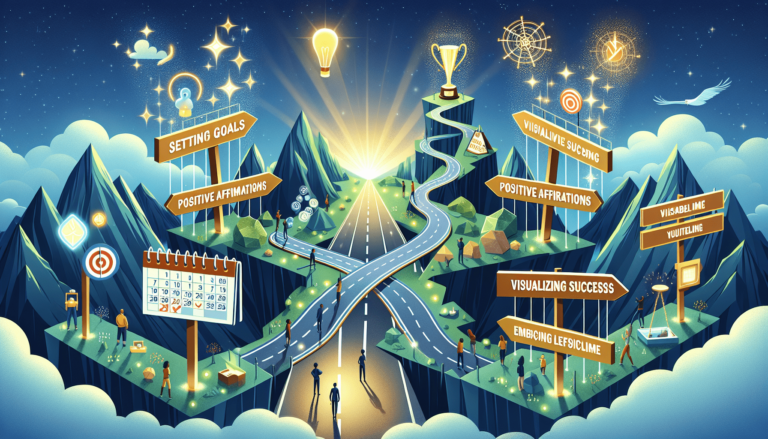What Are Tips For Creating A Motivating Personal Environment?
Are you looking to create a personal environment that motivates and energizes you? Look no further! In this article, we will explore tips and strategies for creating a space that inspires and uplifts, allowing you to thrive in various aspects of your life. From organizing your physical space to curating your digital environment, we will provide practical advice to help you create a motivating personal environment. So, let’s dive in and discover how you can transform your surroundings into a sanctuary of motivation and productivity.

Setting Clear Goals
Identify your goals
Setting clear and specific goals is essential for maintaining motivation and productivity. Take some time to think about what you want to achieve in your personal and professional life. Whether it’s completing a project, learning a new skill, or improving your overall well-being, knowing your goals will provide you with a sense of direction and purpose.
Break down your goals into smaller tasks
Once you have identified your goals, break them down into smaller and more manageable tasks. This will prevent you from feeling overwhelmed and help you stay focused. Breaking goals down into smaller tasks also allows you to track your progress more effectively, providing a sense of accomplishment along the way.
Set deadlines for each task
To ensure that you stay on track and maintain momentum, set deadlines for each task. Deadlines create a sense of urgency and give you a clear timeline to work with. However, make sure to set realistic deadlines that take into account your other commitments and allow for flexibility. By setting deadlines, you’ll be better able to prioritize your tasks and accomplish your goals more efficiently.
Creating a Productive Workspace
Keep your workspace clean and organized
A cluttered and disorganized workspace can greatly affect your productivity and motivation. Take the time to declutter your workspace and keep it organized. Keep only essential items within reach and store everything else neatly out of sight. By maintaining a clean and organized workspace, you’ll feel more focused and ready to tackle your tasks.
Personalize your workspace
Make your workspace your own by adding personal touches that bring you joy and inspiration. Decorate your desk with pictures of loved ones, artwork, or items that have sentimental value. By personalizing your workspace, you’ll create a pleasant and inviting environment that reflects your personality and keeps you motivated.
Eliminate distractions
Distractions can derail your focus and hinder your productivity. Identify the potential distractions in your workspace and take steps to minimize or eliminate them. This might include turning off social media notifications, closing unnecessary tabs on your computer, or using noise-canceling headphones. By eliminating distractions, you’ll be better able to stay in the zone and accomplish your tasks efficiently.
Surrounding Yourself with Positive Vibes
Choose uplifting colors for your environment
The colors in your environment can have a significant impact on your mood and motivation. Choose colors that uplift and energize you, such as vibrant shades of blue or yellow. Incorporate these colors into your workspace through accessories or wall paint. Surrounding yourself with uplifting colors will help create a positive and inspiring atmosphere.
Incorporate natural elements
Bringing elements of nature into your environment can have a calming and rejuvenating effect. Place plants around your workspace to add a touch of greenery and improve air quality. Consider using natural materials like wood or stone in your decor. Connecting with nature can help reduce stress and increase your overall well-being, contributing to a motivating personal environment.
Display motivational quotes or images
Surround yourself with motivational quotes or images that resonate with you. Create a vision board or hang up inspiring posters to remind yourself of your goals and keep you motivated. Seeing these positive messages regularly will help you stay focused and determined to achieve your objectives. You can also use screensavers or wallpapers on your electronic devices as visual reminders of what you’re working towards.
Establishing a Routine
Create a daily schedule
Having a daily schedule provides structure and helps you stay organized. Plan out your day by allocating specific time slots for different tasks and activities. Be realistic when creating your schedule and allow for flexibility. By having a clear outline of your day, you’ll be able to manage your time effectively and accomplish your goals more efficiently.
Prioritize your tasks
Not all tasks are equally important or urgent. Take the time to prioritize your tasks based on their importance and deadline. This will help you focus on the most critical tasks and avoid wasting time on less significant ones. Prioritizing tasks ensures that you make progress towards your goals and maintain a sense of accomplishment.
Allow for breaks and downtime
While it’s important to work hard and stay focused, it’s equally important to give yourself regular breaks and downtime. Incorporate short breaks throughout your day to rest and recharge. Use this time to stretch, take a walk, or engage in activities that help you relax and clear your mind. Allowing for breaks and downtime not only improves productivity but also prevents burnout and promotes overall well-being.
Managing Stress and Avoiding Burnout
Practice self-care activities
Taking care of your physical and mental well-being is crucial for maintaining motivation and preventing burnout. Make it a priority to engage in self-care activities regularly. This might include exercise, meditation, journaling, or spending time in nature. Find what works best for you and make time for these activities, even if it’s just for a few minutes each day. By prioritizing self-care, you’ll be better equipped to handle stress and stay motivated.
Delegate tasks when necessary
Don’t be afraid to ask for help or delegate tasks when you’re feeling overwhelmed. Trying to do everything on your own can lead to stress and burnout. Identify tasks that can be delegated to others and communicate your needs. Delegating tasks not only lightens your workload but also allows you to focus on the tasks that require your expertise and attention.
Take regular breaks throughout the day
In addition to allowing for breaks during your workday, it’s essential to take regular breaks throughout the day. Step away from your workspace and engage in activities that you enjoy. This might include reading a book, listening to music, or practicing a hobby. Regular breaks help rejuvenate your mind and prevent mental fatigue, improving your overall motivation and well-being.
Utilizing Technology and Tools
Use productivity apps or software
There are numerous productivity apps and software available that can help you stay organized and manage your tasks effectively. Explore different options and find one that suits your needs and preferences. These tools can assist in tracking your goals, setting reminders, and managing your overall productivity. By utilizing technology, you can optimize your efficiency and motivation.
Make use of time management tools
Time management tools such as calendars and timers can be invaluable in helping you stay on track with your tasks. Use a calendar to schedule your appointments, deadlines, and activities. Set timers to create a sense of urgency and keep you focused during designated work periods. Time management tools provide structure and accountability, aiding in maintaining motivation and productivity.
Automate repetitive tasks
Take advantage of technology to automate repetitive tasks that take up valuable time and energy. Identify tasks that can be automated, such as email responses or social media scheduling. Use automation tools to streamline these processes and free up time for more important tasks. By automating repetitive tasks, you’ll be able to focus on activities that require your creativity and expertise.
Seeking Inspiration and Learning Opportunities
Read books or articles on personal development
Reading books or articles on personal development can be an excellent source of inspiration and motivation. Choose topics that align with your interests and goals. Look for books or articles that provide practical tips and strategies for personal growth. Reading about the experiences and insights of others can help spark new ideas and keep you motivated on your journey.
Surround yourself with motivated individuals
Surrounding yourself with motivated individuals who share similar goals can have a powerful impact on your own motivation. Seek out supportive communities or join groups centered around your interests or professional field. Engaging with like-minded individuals allows for collaboration, learning opportunities, and motivation through shared experiences. Together, you can inspire and uplift each other towards success.
Attend workshops or seminars
Attending workshops or seminars related to your field of interest can provide valuable learning opportunities and inspiration. Look for events that offer insights, strategies, and practical advice from experts in your industry. Participating in these events exposes you to new ideas, expands your network, and fuels your motivation. Take advantage of learning opportunities to continually grow and develop yourself.
Maintaining a Healthy Work-Life Balance
Set boundaries between work and personal life
Maintaining a healthy work-life balance is essential for overall well-being and motivation. Set clear boundaries between your work and personal life. Establish designated work hours and commit to disconnecting from work during your personal time. This might mean not checking emails or avoiding work-related tasks outside of work hours. By setting boundaries, you can create a sense of separation and prioritize time for yourself and your loved ones.
Make time for hobbies and leisure activities
Don’t forget to make time for hobbies and leisure activities that bring you joy and relaxation. Engaging in activities that are unrelated to work helps recharge your mind and prevent burnout. Whether it’s reading, playing sports, painting, or cooking, carve out time in your schedule for activities that nourish your soul and bring you happiness. Making time for hobbies promotes a well-rounded life and enhances your overall motivation.
Practice mindfulness and relaxation techniques
Incorporating mindfulness and relaxation techniques into your daily routine can significantly impact your well-being and motivation. Take a few moments each day to practice deep breathing exercises, meditation, or yoga. These practices help reduce stress, increase focus, and promote emotional well-being. Connecting with yourself and being present in the moment allows you to recharge and approach your tasks with renewed motivation.
Regularly Evaluating and Adjusting
Assess your progress and achievements
Regularly evaluate your progress and achievements to track your growth and stay motivated. Take time to reflect on your goals and assess how far you have come. Celebrate your accomplishments, both big and small, and acknowledge the progress you have made. By recognizing your achievements, you’ll foster a sense of pride and motivation to keep pushing forward.
Identify areas for improvement
In addition to celebrating your successes, identify areas for improvement. Reflect on the challenges and obstacles you have faced and consider how you can overcome them moving forward. By identifying areas for improvement, you can develop actionable strategies to enhance your performance and motivation. Embrace a growth mindset and view setbacks as opportunities for learning and growth.
Modify your environment accordingly
Based on your evaluations and insights, make any necessary adjustments to your environment. This might involve reorganizing your workspace, updating your schedule, or implementing new strategies. Adapt your environment to support your goals and create an atmosphere that fosters motivation. By continuously optimizing your surroundings, you’ll create a conducive space for productivity and achievement.
Celebrating Milestones and Rewarding Yourself
Acknowledge and celebrate your accomplishments
It’s important to take the time to acknowledge and celebrate your accomplishments along the way. Whenever you reach a milestone or achieve a goal, pause and appreciate your hard work and dedication. Share your achievements with others, whether it’s your friends, family, or colleagues. Celebrating your accomplishments boosts your self-confidence and motivation, reinforcing your belief in your abilities.
Reward yourself with small treats or incentives
Rewarding yourself for reaching milestones can provide an extra boost of motivation. Establish small treats or incentives that you can look forward to as you make progress. This could be treating yourself to your favorite dessert, taking a day off to relax, or buying something you’ve been wanting. The reward doesn’t have to be extravagant; it’s about acknowledging your achievements and providing yourself with positive reinforcement.
Create a sense of accomplishment and motivation
Create a sense of accomplishment and motivation by setting new goals and challenging yourself. Once you have achieved a goal, take some time to reflect on your journey and consider what you want to accomplish next. Setting new goals keeps you engaged and motivated, fostering continuous growth and improvement. By constantly striving for new achievements, you’ll maintain a sense of purpose and motivation in your personal environment.
Discover more from
Subscribe to get the latest posts sent to your email.







